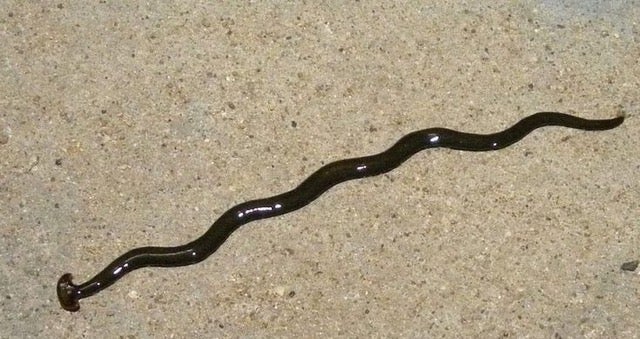Master Gardeners: A few summer gardening tips
Published 12:23 am Saturday, August 8, 2020

- Courtesy photo Hammerhead Worms: A Carnivorous Foe to Earthworms
|
Getting your Trinity Audio player ready...
|
Certified Texas Master Gardener, Orange County Master Gardeners
Hammerhead Worms: A Carnivorous Foe to Earthworms — Just this past week I saw a posting on one of the social media groups I belong to on gardening talking about Hammerhead Worms. It was very interesting to learn these little monsters eat our beloved earthworms and we can’t have that. In the event you are not familiar with them, they look so similar to an earthworm many people probably mistake them for earthworm. But there is one big difference, they have a “hammerhead” like the hammerhead shark. Now, not to say they are not good for the garden, they do protect plants from other harmful insects such as termite larvae and grubs. Some of these worms can grow up to 20 inches long, but the longest I have ever seen is about 4-6 inches.
They are nocturnal but could see them early in the morning. I find them on my driveway and sidewalks. They need a moist environment like earthworms and leave a slime trail like slugs and snails. They are not harmful to humans. They follow an earthworm’s trail, capture it then devour it in a frightful manner I will not go into.
Several ways to get rid of the Hammerhead worms are: One – spray them with citrus oil. Go out early in the morning looking for them, when you find them spray completely with the citrus oil. Two – fine sea salt or vinegar. Collect them in a jar and cover with the fine sea salt. If the citrus oil or sea salt do not work, then cover with vinegar. Neem oil will work also, but will not affect earthworms.
Pecan Trees need help— The kernels on pecans are forming now, and it takes a lot of water for them to fully grow and ensure optimal development. Water deeply from the drip line in about halfway to the trunk of the tree. Do this weekly for then next several weeks when we do not have a good heavy soaking rain. If you do, you will have nice full pecans this fall.
Weeding – Many weeds pop up during the summer as they love the heat and go from teeny to gigantic overnight, stealing your plants needed moisture and nutrients, encouraging pests into your garden. Pull them when they are small and when the ground is moist as they are the easiest to come and before they flower, saving yourself weeding next year. A single dandelion plant can produce up to 2,000 seeds in one year. Get out early in the morning before the sun gets up or in the late afternoon as the sun is setting when it is cooler to do your weeding.
Mulch, Mulch, Mulch – Adding mulch to your garden will help protect your plants two ways. First it will keep the hot sun off the roots of your plants so they won’t burn and second it will help keep the moisture in prevent less loss after you have watered. Mulch with anything that is organic, such as leaves, shredded wood, pine straw, bark chips, etc., as it will help the soil in the long run as it decomposes over time adding nutrients to your soil along with making your garden look nice.
These are just a few of the many tips that can be found on our website https://txmg.org/orange
Click Resources, then Gardening Information for all Garden Types. Scroll down to Monthly TO-DO’s. These are from June and July/August.
If you have any gardening questions, please call our Hot-Line Tuesday and Thursday’s from 10 a.m. – 2 p.m. on 409 882-7010. If after these times you can send your question to our website https://txmg.org/orange on our Contact page or send it to our Facebook page Orange County Texas Master Gardeners.
Our next Master Gardener certification class will start September 3, with orientation August 27. Classes currently will be virtual with the option of attending online live or listening to the recording. Classes will be each Thursday. Class fee is $150 which will include your training handbook, supplies and speakers’ fees. Please visit our website above and click the link JOIN MG for more information.






